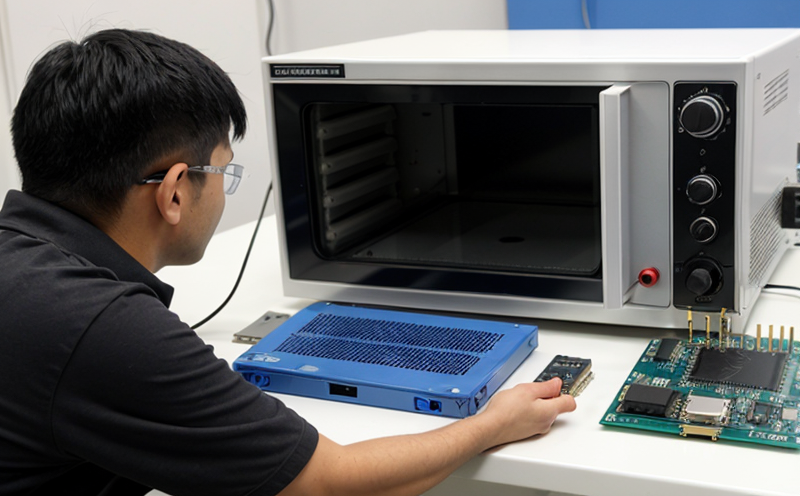EN 60068 Environmental Testing for Microelectronic Parts
The European Standard EN 60068 is a comprehensive suite of environmental test methods designed to ensure the robustness and reliability of electrical and electronic products under various environmental conditions. This standard plays an essential role in ensuring that microelectronic components meet stringent quality and safety standards, thereby enhancing product performance and durability.
EN 60068 is widely recognized for its detailed guidelines on conducting tests such as thermal cycling, vibration testing, humidity conditioning, and more. These tests are crucial for identifying potential weaknesses in the design of microelectronic parts before they enter mass production or deployment into real-world applications. By subjecting these components to controlled environmental stressors, manufacturers can validate their products' ability to withstand harsh conditions without compromising functionality.
The scope of EN 60068 covers a wide range of tests aimed at assessing the impact of different environmental factors on microelectronic parts. This includes thermal cycling (ASTM E378), which simulates temperature changes similar to those experienced during manufacturing processes or transportation; humidity testing (ISO 11935-2) designed to evaluate how moisture affects components over time; as well as shock and vibration tests (IEC 60241) intended to mimic the effects of mechanical stress encountered in use.
For R&D engineers involved in developing new microelectronic devices, adhering to these standards helps ensure that prototypes are thoroughly tested before being introduced into larger-scale development cycles. Compliance with such internationally recognized protocols also supports efforts towards achieving certification requirements set forth by regulatory bodies like the US Food and Drug Administration (FDA) or European Union directives.
Environmental testing laboratories specializing in EN 60068 services offer state-of-the-art facilities equipped with specialized equipment capable of replicating real-world environments. From temperature chambers to humidity cabinets, these labs provide controlled conditions necessary for accurate test results. Additionally, experienced technicians perform rigorous specimen preparation procedures ensuring consistent data collection across all samples tested.
Upon completion of testing, detailed reports are generated summarizing each phase of the process along with corresponding findings. These reports serve multiple purposes including informing design improvements based on identified issues during testing or providing documentation needed for compliance validation purposes.
Why It Matters
The importance of EN 60068 environmental testing cannot be overstated. In today’s increasingly complex and interconnected world, electronic devices are exposed to a wide variety of environmental conditions that can affect their performance significantly. Ensuring these components meet the specified criteria outlined in this standard is critical for maintaining high levels of quality assurance.
- Thermal Cycling: This process simulates how components behave when subjected to rapid temperature fluctuations, which are common during transportation or industrial operations.
- Vibration Testing: By exposing samples to controlled vibration forces, this test evaluates whether microelectronic parts remain stable under conditions similar to those experienced in vehicles or machinery.
- Humidity Conditioning: This ensures that components can endure prolonged exposure to moisture without degradation, particularly important for outdoor applications like solar panels or weatherproof electronics.
The results of these tests provide invaluable insights into the durability and reliability of microelectronic parts under different environmental conditions. For instance, companies in sectors ranging from automotive manufacturing to aerospace engineering rely on accurate EN 60068 testing services to guarantee their products’ longevity and safety.
Moreover, compliance with this standard helps businesses avoid potential legal issues associated with product failures or recalls due to insufficient quality control measures. It also fosters trust among consumers by demonstrating a commitment to maintaining consistent product standards across all market segments.
Quality and Reliability Assurance
Quality assurance (QA) and reliability are paramount in the electronics industry, especially when dealing with microelectronic parts. The rigorous testing protocols prescribed by EN 60068 play a vital role in ensuring that these components meet stringent quality standards before being incorporated into end products.
The primary goal of QA is to identify potential defects early on within the manufacturing process so they can be addressed promptly, thereby minimizing costs associated with rework or scrapping defective items later down the line. Through comprehensive environmental testing conducted according to EN 60068 guidelines, manufacturers gain valuable insights into how their components behave under various stressors.
Reliability refers to a product’s ability to function correctly over its intended lifespan without failure. For microelectronic parts used in critical applications such as medical devices or avionics systems, reliability is non-negotiable. By subjecting these components to severe environmental conditions during testing, engineers can uncover any latent issues that might otherwise go unnoticed until after deployment.
Compliance with EN 60068 helps establish a robust quality assurance framework by providing clear criteria against which tests must be performed. This ensures consistency in methodology across different laboratories and facilities worldwide. As a result, customers can have confidence knowing that the microelectronic parts they purchase meet industry-leading standards for both quality and reliability.
Environmental and Sustainability Contributions
- Energy Efficiency: Ensuring that electronic devices operate efficiently reduces energy consumption, which in turn lowers greenhouse gas emissions. By adhering to EN 60068 standards during the design phase, manufacturers can optimize power usage while maintaining performance levels.
- Sustainable Materials: The rigorous testing required by this standard encourages the use of sustainable materials that are both durable and environmentally friendly. This promotes a circular economy where resources are used efficiently throughout the product lifecycle.
- Reduced Waste: Through thorough environmental testing, potential design flaws can be identified early on, reducing waste from defective products reaching consumers or being scrapped during production processes.
The implementation of EN 60068 not only benefits the electronics industry but also contributes positively to global sustainability goals. By promoting energy efficiency and responsible material selection, this standard supports broader initiatives aimed at reducing environmental impact across various sectors.





